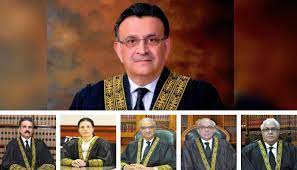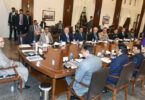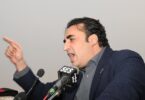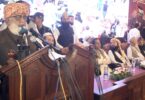F.P. Report
ISLAMABAD: Chief Justice of Pakistan, Justice Umar Ata Bandial has rejected the plea to issue a stay order on a set of petitions challenging the trial of civilians in military courts while expressing his hope that no civilians will be tried in military courts while the matter is being heard in the Supreme Court.
The plea for the issuance of a stay order was made by a petitioner’s lawyer Salman Akram Raja which was rejected by the court.
The court also ordered the attorney general to provide complete details of 102 people who were in military custody.
With this, the court adjourned the hearing of the case till tomorrow 9:30am.
Earlier, the seven-judge Supreme Court bench constituted to hear petitions filed against the trial of civilians in military courts was dissolved for the second time on its third hearing on Monday when Justice Mansoor Ali Shah recused himself from the case.
At the outset of the hearing, Attorney General for Pakistan Mansoor Usman Awan told the court that the federal government had an objection to the inclusion of Justice Shah in the bench as the judge himself had said that one of the petitioners was his relative and had asked if anyone had an objection to his being part of the bench.
Justice Shah remarked he had asked in the first hearing if anyone had any objection, he should tell him. Article 4 of the Code of Conduct is very clear, the judge said asking the AGP to be lucid about the objection.
Attorney General said that Justice Shah was related to petitioner ex-CJP Jawad S Khawaja, to which Justice Shah said that he recused himself from the bench.
One of the lawyers requested Justice Shah to set aside AGP’s objections and stay on the bench. The judge, however, said, “I am a very subtle person and if someone raises a finger at me, I will never be part of that bench.”
Saying this, Justice Shah left the bench.
This irked Chief Justice of Pakistan (CJP) Justice Umar Ata Bandial, who told the AGP that the bench could not either be formed or dissolved on the government’s whims and wishes. “Nobody can doubt the competence of the judge in question. Mr Shah is a ‘very sensitive’ person,” the CJP said, adding, “Previously too, the government had raised similar objections. Please don’t malign us.”
The Chief Justice inquired of the AGP whether he was talking about the bias or conflict of interests on the part of the said judge. “On what basis you are objecting? You are a qualified lawyer and you hold good character and values. But the government always talks about the formation of benches. We have always shown restraint. We have not punished those who do not implement court orders, we think it is time to take a step back,” the top judge observed.
Chief Justice Bandial remarked that petitioner Khawaja was an apolitical personality and a dervish person. He said he himself had worked with Khawaja ‘but you want to make the bench controversial once again. In parliament, your client makes political statements and accuse us of being like-minded’.
The CJP went on to say whether the court should summon the prime minister and ask him why his government objected to the inclusion of one judge or the other in the bench. “Sometimes, we are called ‘likeminded’ judges,” he said, “We already have tolerated the government’s behavior.”
The court adjourned the hearing till 11 am today.
Court resumes hearing after break
After the break, a reduced six-member bench headed by Chief Justice Bandial resumed the hearing.
PTI Chairman lawyer Hamid Khan came to the rostrum and said that their application was not numbered.
The CJP remarked that he would come to this matter later, as the bench was now recovering from a setback.
Lawyer Hamid Khan said that one of their requests in the petition was against the military courts.
The Chief Justice remarked “Why don’t you amend your petition? You have made several pleas in one petition.”
Lawyer Hamid Khan said that he would only insist on a plea against the military courts.
The Chief Justice remarked that other methods were being used in the case instead of the constitution and law, adding that ‘it is not a good thing to use such methods’.
Former Chief Justice Jawad S Khawaja’s lawyer submitted written submissions.
Lawyer Salman Akram Raja said that the case of Junaid Razak’s son was in the military court and he appeared in the court on his behalf. He said that the real question was whether a military court has judicial powers. A trial can only be conducted by a judge appointed under Article 175, he argued, adding that the principle of separation of powers was not clear when the FBLE case was decided.
Then the court again announced a 45 minutes break.
After the break when the hearing started, petitioner Junaid Razak’s counsel Salman Akram Raja continued his arguments.
Raja argued that he challenged Section 2D of the Army Act on the grounds that a civilian could not be tried under it. He said how a distinction could be made that some people would go for trial in ordinary courts and others in military courts on the same charge.
After that, PTI Chairman’s lawyer Uzair Bhandari started the arguments.
Bhandari said that they support all the petitioners and they want an open trial, if anyone is guilty, he should be punished, and a judicial commission should be formed to investigate the events of May 9.
The Chief Justice remarked that do not talk about the achievement of goals and aspirations for political purposes.
The Chief Justice directed the PTI chairman’s lawyer to speak only about the law.
The Chief Justice made oral remarks that he expected the military courts would not initiate trials while the case was pending in the Supreme Court. He also said that it is alleged that the accused are not being allowed to meet their families. There are also some complaints of non-supply of food and books.
The Chief Justice while talking to the Attorney General said that Salman Raja asked for some assurances in the arguments, tell the court what instructions you have in this regard.
The Attorney General said that the investigation process is ongoing with 102 people who are still in the custody of the army.
The Chief Justice remarked that the number of these 102 people may be less during the investigation.
The Attorney General said that if none of these 102 people come under the jurisdiction of military courts in the investigation, their cases will be tried in ordinary courts.
Petitioner Aitzaz Ahsan’s lawyer Latif Khosa’s arguments have been completed, while former Chief Justice Khawaja’s lawyer Khawaja Ahmed Hussain and civil society lawyer Faisal Siddiqui have also completed their arguments.
Attorney General Mansoor Usman Awan and Prime Minister Shehbaz Sharif’s lawyer Ferogh Naseem will give arguments in the case.
Besides them, the lawyers of PTI Chairman Imran Khan, defence, and interior ministries will also present their arguments.
Bench dissolution
The seven-member larger bench led by CJP Bandial was comprised of Justice Ijazul Ahsan, Justice Syed Mansoor Ali Shah, Justice Munib Akhtar, Justice Yahya Afridi, Justice Syed Mazahir Ali Akbar Naqvi, and Justice Ayesha Malik.
Earlier, Chief Justice-designate Justice Qazi Faez Isa and Justice Sardar Tariq Masood also left the bench.
The originally nine-member SC bench has been reduced to a six-member bench now.
Courtesy: (24news)







